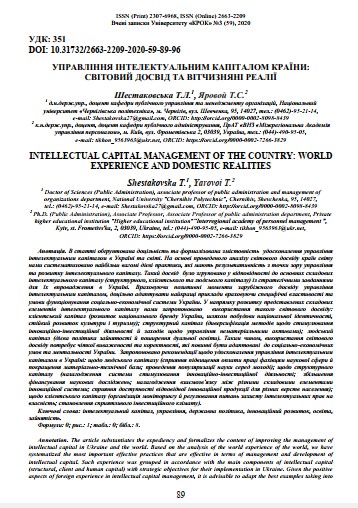INTELLECTUAL CAPITAL MANAGEMENT OF THE COUNTRY: WORLD EXPERIENCE AND DOMESTIC REALITIES
DOI:
https://doi.org/10.31732/2663-2209-2020-59-89-96Keywords:
intellectual capital, management, state policy, innovative development, education, employmentAbstract
The article substantiates the expediency and formalizes the content of improving the management of intellectual capital in Ukraine and the world. Based on the analysis of the world experience of the world, we have systematized the most important effective practices that are effective in terms of management and development of intellectual capital. Such experience was grouped in accordance with the main components of intellectual capital (structural, client and human capital) with strategic objectives for their implementation in Ukraine. Given the positive aspects of foreign experience in intellectual capital management, it is advisable to adapt the best examples taking into account the specific properties and conditions of the socio-economic system of Ukraine. In the direction of development of the presented components of intellectual capital we proposed the use of the following world experience: client capital (development of the national brand of Ukraine, by building a national identity, sustainable development of culture and tourism); structural capital (diversification of methods for stimulating innovation and investment activities and measures for the management of intangible assets); human capital (effective employment policy and dissemination of dual education). Thus, the use of world experience requires a clear balance and correctness, which must be adapted to the socio-economic conditions and mentality of Ukraine. Recommendations for improving the management of intellectual capital in Ukraine are proposed: for human capital (assistance in raising the salaries of specialists in the scientific field and improving the material and technical base; promoting science among young people); on structural capital (establishing a system of stimulating innovation and investment activities; increasing funding for research; establishing a relationship between the various components of the innovation system; promoting the availability of appropriate innovative products for different segments of the population); on client capital (organization of monitoring and regulation of issues of protection of intellectual property rights; formation of a favorable investment climate).
Downloads
References
Столяр О. Розвиток дипломатичної служби в контексті європейського вибору України. Внутрішні й зовнішні аспекти євроінтеграційної політики України: матеріали конгресу за міжнар. участю (Київ, 17-18 жовт. 2013 р.) / за заг. ред. Ю.В. Ковбасюка, К. О. Ващенка, І. А. Грицяка, С. В. Загороднюка. Київ: НАДУ, 2013. С. 97-98.
Амосов О. Ю., Гавкалова Н. Л. Підготовка кадрів для державної служби як засіб формування інтелектуального капіталу державної служби. 2009. URL : http:/ /www.dridu.dp.ua/zbirnik/200902/09aoykdu.pdf.
Марутян Р. Інтелектуальні ресурси державного управління в системі забезпечення державної влади. Збірник наукових праць Національної академії державного управління при Президентові України. 2012. Вип. 1. С. 277-286. URL: http://nbuv.gov.ua/UJRN/ znpnadu_2012_1_30.
Білоус І. М. Захист прав інтелектуальної власності: український і зарубіжний досвід. Вісник Маріупольського державного університету. Серія: Право. 2016. Вип. 11. С. 20-27. URL : http://nbuv.gov.ua/UJRN/Vmdu_ pr_2016_11_4.
Попело О. В. Інтелектуальний капітал: теоретичний аспект і сучасні тенденції розвитку в Україні. Економіка і регіон. 2015. № 2. С. 66-78. URL: http:// nbuv.gov.ua/UJRN/econrig_2015_2_14.
Курило Л. І. Інтелектуальний капітал: теоретичний аспект. Академія муніципального управління. 2006. URL : http://www.rusnauka.com/NIEK_2006/Economics/9_17570.doc.htm.
Кісь С. Я. Наукові основи інтелектуалізації діяльності підприємств: дис. докт. ек. наук : 08.00.04. / Кісь С. Я. Івано-Франківськ, 2016. 494 с.
Кравчук Н. О. Споживчий капітал як елемент інтелектуального капіталу: сутність та структура. Ефективна економіка. 2013. URL: http://www.economy.nayka.com.ua/?op=1&z=2199.



